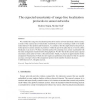Free Online Productivity Tools
i2Speak
i2Symbol
i2OCR
iTex2Img
iWeb2Print
iWeb2Shot
i2Type
iPdf2Split
iPdf2Merge
i2Bopomofo
i2Arabic
i2Style
i2Image
i2PDF
iLatex2Rtf
Sci2ools
136
click to vote
ALGOSENSORS
2004
Springer
2004
Springer
The Expected Uncertainty of Range Free Localization Protocols in Sensor Networks
We consider three range-free localization protocols for sensor networks and analyze their accuracy in terms of the expected area of uncertainty of position per sensor. Assuming a small set of anchor nodes that know their position and broadcast it, we consider at first the simple Intersection protocol. In this protocol a sensor assumes its position is within the part of the plane that is covered by all the broadcasts it can receive. We then extend this protocol by assuming every sensor is preloaded with the entire arrangement of anchors before being deployed. We show that in this case the same expected uncertainty can be achieved with 1/2 the anchor nodes. Finally, we propose an approximation for the arrangement-based protocol which does not require any preliminary steps and prove that its expected accuracy converges to that of the arrangement protocol as the number of anchors increases. © 2005 Elsevier B.V. All rights reserved.
Related Content
| Added | 30 Jun 2010 |
| Updated | 30 Jun 2010 |
| Type | Conference |
| Year | 2004 |
| Where | ALGOSENSORS |
| Authors | Gideon Stupp, Moshe Sidi |
Comments (0)

